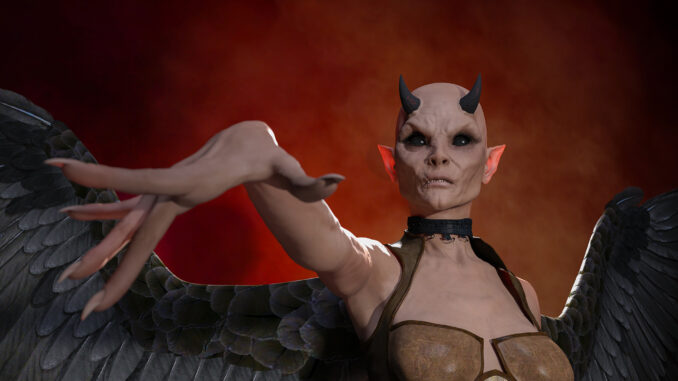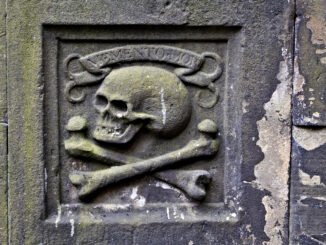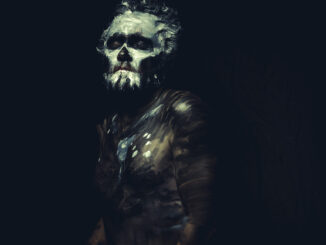
Greece of antiquity is regarded by scholars and historians as being the birthplace of western civilization. Philosophy, art and democracy are three of this ancient culture’s many contributions to the world. Greeks considered themselves to be motivated by intellectual pursuits. Mirroring this, they had a complex belief system in many deities and superstitions. Among those superstitions and myths can be found hideous beings possessing an insatiable thirst for blood. And as you might expect, Greek vampires are truly terrifying.
According to lesser known Greek mythology, the people lived in terror of four monstrous vampiric beings, Empusa, Lamia, Striges, and the undead Vrykolakos. And what better way to start with the divinely born Empusa, a vampire born into a legacy of witchcraft.
Empusa was the daughter of Hecate, goddess of magic, necromancy and crossroads. To say that Empusa was the physical embodiment of terror would be a gross understatement. Empusa was described as having bronze feet, razor sharp claws and she possessed an unquenchable thirst for the blood of men. In her natural form, monstrous Empusa could hardly attract the attention of a man. To attract men, she would shapeshift into a beautiful young woman. When she snagged a man while in the guise of a human, Empusa would change back to her natural form and suck her victim dry until they fell dead at her feet.
Unlike Empusa who was divinely born, Lamia’s origins are human and far more tragic. According to mythology, Lamia, was the only child of a king and she was so beautiful she commanded the attention of every man in the land. Men would come from all over the known world to court her favor. With each prince, Lamia, would dismiss them with a wave of her hand and a sneer. There was one person who did manage to win her affection, the king of the gods himself, Zeus.

T-Shirts, Mugs and More!
We now have t-shirts, tarot decks, ESP cards, coffee mugs, face masks, and much more merchandise available for purchase. Every dollar spent helps fund Paranormal Study!
Lamia and her divine suitor carried on a passionate love affair that produced several children. One day, Zeus’s wife, Hera discovered her husband’s infidelity and went on a killing spree. Hera killed all of Lamia’s children to teach her husband, and the mortal woman he loved, a lesson. Devastated by the death of her children, Lamia went mad and swore vengeance on Hera by feeding on the flesh and blood of young men. Her hatred burned so bright, it transformed her into a monstrous being. There wasn’t a man alive who was safe from Lamia’s blood lust.
The Striges, like Lamia, targeted young men as their preferred source of food. Striges were described as giant black birds with a human body. Striges haunted the night sky and would swoop out of the shadows and carry off young men as they traveled down lonely roads. Researchers of vampiric folklore believe Striges served as the inspiration for the Romanian Strigoi, a vampire who drinks blood and spreads disease.
Rounding off this list of Greek vampires is the undead, Vrykolakos. This fiendish being is closely related to the revenant undead that plagued Slavic lands in eastern Europe. Its name is even similar to the Vukodlak of Serbia and the Vilkolakis of Lithuania. Much like its counterparts, a person who either killed themselves or was excommunicated could become a Vrykolakos after death.
There are a couple of things that sets this Greek vampire apart from its Slavic cousins. First, a Vrykolakos doesn’t drink blood, but rather eats its victim’s liver. Secondly, they are known to wear down their victims by engaging in poltergeist activity when admitted into a home by an unwitting resident. One Greek superstition says to never open the front door after hearing one knock. A Vrykolakos will not knock a second time as it will become impatient and move on to another victim. This may be the origin of the myth that a vampire must be properly admitted by the master of a house.
In Homer’s epic tale, “The Odyssey,” his hero, Odysseus, travels to the gates of Hades to enter the underworld. When he gets there, the shades, or ghosts, will not talk to him unless he sacrifices a black lamb. The shade’s thirst for blood will only be satisfied by a black lamb.
It would seem the Greeks didn’t just give us western civilization. They gave us the undead as well.
If you found the content in this article to be of any value to your paranormal studies, please let us know in the comments below. Feel free to share this article with your friends as well because if you found it interesting, they might too.
Do You Want To Know More?
Our content creators also have podcasts that go much deeper into paranormal topics.
Tim Woolworth’s Walk in the Shadows, an episodic masterclass that consists of a deep dive into all things Fortean, paranormal and supernatural.
Rick Hale teams up with Stephen Lancaster in The Shadow Initiative where they explore various paranormal topics and discuss current paranormal news.
Please check these shows out and visit Paranormal Study social media to keep up to date on articles and all the things our authors are doing.




Be the first to comment